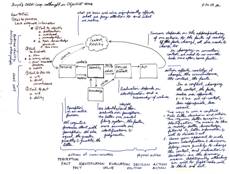Thinking Skills
These books teach general skills in creativity, self-awareness, problem solving and turning ideas into effective action.
Mental Clarity
- Philosophy: Who Needs It by Ayn Rand. This motivational essay explains why philosophy is necessary to human life.
- Thinking Directions – Thinking Directions teaches courses on improved thinking skills, particularly methods for sustained, effective thinking on difficult or complex problems.
- The Payoff Principle, Discover the 3 Secrets for Getting What YOu Want Out of Life and Work by . Philosophy provides the fundamental concepts and principles that guide men and women on earth. Applying those principles takes further knowledge and work. The Payoff Principle provides a comprehensive program for identifying what you want from your life and the goals and processes to achieve those values. While other books go deeper into specific areas, this is the only book that I know of that covers the breadth of the practices you need to succeed in your ambitions.
- The Art of Learning, An Inner Journey to Optimal Performance by , Tim Ferriss. Josh Waitzkin knows what it means to be at the top of his game. A public figure since winning his first National Chess Championship at the age of nine, Waitzkin was catapulted into a media whirlwind as a teenager when his father's book Searching for Bobby Fischer was made into a major motion picture. After dominating the scholastic chess world for ten years, Waitzkin expanded his horizons, taking on the martial art Tai Chi Chuan and ultimately earning the title of World Champion. How was he able to reach the pinnacle of two disciplines that on the surface seem so different? "I've come to realize that what I am best at is not Tai Chi, and it is not chess," he says. "What I am best at is the art of learning." The Art of Learning takes listeners through Waitzkin's unique journey to excellence. He explains in clear detail how a well-thought-out, principled approach to learning is what separates success from failure. Waitzkin believes that achievement, even at the championship level, is a function of a lifestyle that fuels a creative, resilient growth process. Rather than focusing on climactic wins, Waitzkin reveals the inner workings of his everyday method, from systematically triggering intuitive breakthroughs, to honing techniques into states of remarkable potency, to mastering the art of performance psychology. In stories ranging from his early years taking on chess hustlers as a seven year old in New York City's Washington Square Park, to dealing with the pressures of having a film made about his life, to International Chess Championships in India, Hungary, and Brazil, to gripping battles against powerhouse fighters in Taiwan in the Push Hands World Championships, The Art of Learning encapsulates an extraordinary competitor's life lessons in a pause-resisting narrative.
- The Worry Cure, Seven Steps to Stop Worry from Stopping You by . "Worry -- and searching for certainty -- is a form of emotional avoidance." Leahy shows how to let go of worry and become more aware of both your inner, emotional life and the world around you, thereby living more dynamically and authentically, making better decisions, taking better actions, and living a happier and longer life.
Stay Goal Directed
- Decide, Work Smarter, Reduce Your Stress, and Lead by Example by . Decide what you will do with your life each day by consciously prioritizing by value. This up-ends the traditional A-B-C system which instead prioritizes by urgency, often the chaos of circumstances. McClatchy's A-B-C system is: A activities are those that are gain activities, long-term investments in your life's goals; B and C are prevent pain tasks that (respectively) are monitored or not by someone else.
- So Good They Can't Ignore You, Why Skills Trump Passion in the Quest for Work You Love by Cal Newport. "All you have to do is follow your passion!" turns out to be terrible career advice. Waiting for passion to strike or merely working in a field you imagine you might love will not lead to career happiness. It isn't enough. It isn't even the starting point. What will give you the best shot at happiness is to be so good at producing value that you have the career capital to pick your mission and exercise control over how you achieve it. This book describes the importance of having skills, especially rare and valuable skills, as well as how to efficiently learn them and then exercise them for your maximum benefit.
- Advice for a Young Investigator by Santiago Ramón y Cajal. Santiago Ramón y Cajal, 1852 - 1934, is the father of modern brain science. In addition to his groundbreaking work on the structure of the nervous system, Cajal was concerned that the culture of his country, Spain, seriously lagged behind other Western countries in its appreciation for and abilities in science, which he sought to remedy by lectures and this gem of a small book of advice to prospective scientists. Its advice is applicable to anyone who seeks to achieve at the cutting edge of his chosen field.
Be Logical
- Antifragile, Things that Gain from Disorder by . Taleb is one of the few modern thinkers seriously considering how to act and thrive in a dynamic world. For most of history, people have feared change per se and tried to suppress it, for example, the 3,500 year, static Ancient Egyptian culture. Today, people may seek safety rather than growth in their jobs, or favor government policies that appear to deliver stability at the expense of liberty. Taleb argues that dynamism is necessary to life, and details a strategy to capitalize on variety and change. One can arrange one's affairs to benefit from a dynamic future, even while not knowing what that future will be!
- Decision Traps, The Ten Barriers to Brilliant Decision-Making by .
- The Logic of Failure, Recognizing and Avoiding Error in Complex Situations by . Explains why people make dumb mistakes, how you can recognize one blooming and how you can think your way out.
- The Effective Executive, The Definitive Guide to Getting the Right Things Done by . identifies the principles for effective decision-making and action. Equally applicable to a whole life as well as business specifically, an effective executive concentrates his time and energy on the most important opportunities that will have decisive consequences and makes that concentration into a conscious habit.
- The New Rational Manager by . Problem-solving and decision techniques, focussing on the human side of change and improvement.
- The Power of Intuition, How to use your Gut Feelings to make Better Decisions at Work by .
Respect Mental Needs
- The Checklist Manifesto, How to Get Things Right by . Checklists allow one to manage complexity and cognitive overload. Gawande shows, first, that checklists are the means, during complex situations, to consistently apply the knowledge that is available in our minds but that we might forget to use. Second, checklists permit us to manage the assembly and integration of knowledge that is held by different members of an enterprise when facing a complex situation.
- Making It All Work by . Getting Things Done launched a wave of organization and productivity. Making It All Work expands on the earlier ideas, setting them into a more complete context and clarifying certain important ideas such as "Horizons of Focus." it shows how to build a flexible organizational system to support productivity, from the details of getting a lot of work accomplished, through project management, and up to a complete perspective on the values most important to your happiness in your life.
- When Panic Attacks, The New, Drug-Free Anxiety Therapy That Can Change Your Life by . Ignore the title. This book present a universally useful, highly effective method for identifying and resolving the root causes of nearly any personal psychological obstacle in which fear is a component.
- Feeling Good, The New Mood Therapy by . For anyone suffering from feelings of depression, this book provides a proven method to identify and resolve its cause, so that you can proceed to live your live happily.
- The Selfish Path to Romance by . Just about everything most of us have learned about how to find love is wrong. That’s the premise of The Selfish Path to Romance. Love is not about sacrifice. Real, lasting romance comes when you are certain about yourself, your needs, and your worth. In the words of top-selling novelist and philosopher Ayn Rand, "It is one’s one personal, selfish happiness that one seeks, earns and derives from love." Authors Dr. Edwin Locke and Dr. Ellen Kenner are inspired by the work of philosopher and novelist Ayn Rand. Their book explores Ayn Rand’s belief that the assertion of your own needs and values is the foundation of love. The Selfish Path to Romance offers a no-nonsense, rational alternative for those who are serious about finding and sustaining a lifetime romance. Be prepared to have your preconceptions shattered, your intuition challenged, and be ready for candid introspection. -- Publisher's Description
- Mind Over Mood, Change How You Feel by Changing the Way You Think by . Using the approach of Cognitive Therapy, you can identify the ideas that cause your emotions and then think about them consciously.
- Deep Survival, Who Lives, Who Dies, and Why by . It turns out that the ability to keep thinking, even under stress, is the vital difference between life and death.
Put it All Together
- The Autobiography of Charles Darwin by Charles Darwin. This biography is excellent both as literature and as insight into the ideas and thinking methods of the great scientist.
- The Creative Habit, Learn it and Use it for Life by . Practical insights into how to be creative as a sustained lifestyle.
- Great by Choice, Uncertainty, Chaos, and Luck--Why Some Thrive Despite Them All by . Great companies that thrive during danger and chaos do so because they behave differently than others. Collins and Hansen compare paired sets of companies across a range of industries, all of which faced uncertainty and chaos, to identify the factors that differentiate the successful. They induce principles for thriving on chaos, principles that are valuable for everyone and every enterprise.
- How to Solve It, A New Aspect of Mathematical Method by .
- Conceptual Blockbusting, A Guide to Better Ideas by .
- The Thinker's Toolkit by . Fourteen powerful Techniques for Problem Solving
- The Logical Leap, Induction in Physics by . All knowledge rests on induction from the evidence of sensory data, yet philosophers have claimed throughout history that knowledge is either an arbitrary, subjective fantasy or a mystic insight transmitted from another dimension, with induction and sensory evidence peripheral or irrelevant. David Harriman demonstrates the central role of induction and the precise method of valid induction, which, if followed, produces certainty. Further, he demonstrates that knowledge is the integration of sensory data, so all knowledge is contextual and open-ended. Harriman's demonstration is inductive: he uses a detailed history of science to show the inductive method in action; when the proper method has been followed, it has produced mankind's greatest achievements in knowledge, while to the extent ignored or rejected, men have stagnated in ignorance. This book should be essential reading to every philosopher, scientist, and person interested in confidently knowing the validity of knowledge and how to get it.
- Newton and the Counterfeiter, The Unknown Detective Career of the World's Greatest Scientist by . Newton's character shows clearly in this history of his management of the British royal mint. Newton was not a man of aloof theory, but passionately committed to using theory as man's method of understanding and controlling nature, combining intense focus on fundamentals with a deep pursuit of practical details.
Links
- Ayn Rand Lexicon – This online, mini encyclopaedia of Objectivism contains key statements by Ayn Rand on over 400 topics in philosophy, physchology, history and economics.
- Darwin Online – The world's largest and most widely used resource on Darwin
- Dr. Ellen Kenner – Dr. Ellen Kenner, host of The Rational Basis of Happiness
- Edward Tufte – Edward Tufte writes and self-publishes books on graphics and information design.
- Hold That Thought! – Don't let thoughts slip away. Capture them immediately. Here's how.
- Philosophy – Philosophy is the Science that Studies the fundamental nature of Reality and Man's relation to it.
- Study Hacks – Cal Newport writes about "the benefits of living deeply in a distracted world. I’m increasingly convinced that cultivating the ability to concentrate on hard things without distraction is a skill that’s becoming increasingly rare at the same time that it’s becoming increasingly valuable in our economy."
- Talent – The practices that develop talent
- Thinking Directions – Thinking Directions teaches courses on improved thinking skills, particularly methods for sustained, effective thinking on difficult or complex problems.
Credits
- Contributor: Jean Moroney, Consultant and Teacher on Thinking Skills
- Contributor: Oliver Sharp
- Contributor: Ellen Kenner, Clinical Psychologist and host of The RATIONAL Basis of Happinessc© radio show
Contact:
StrongBrains.com
copyright © 2024 Andrew Layman, all rights reserved, 1/15/2024 6:12:12 PM, Topic: Thinking Skills, http://www.strongbrains.com
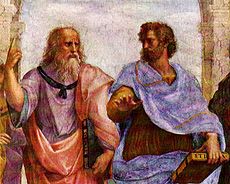
Plato and Aristotle, detail from School of Athens by Raphael
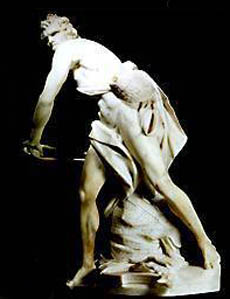
Bernini's David
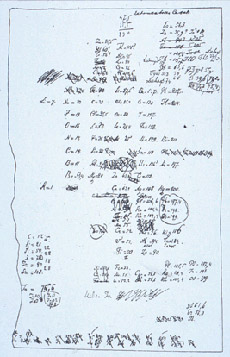
Sketch of Mendeleev's original Periodic Table of the Elements
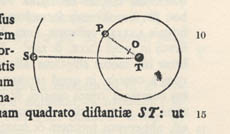
Illustration from Newton's Philosophia Naturalis Principia Mathematica, 1726
